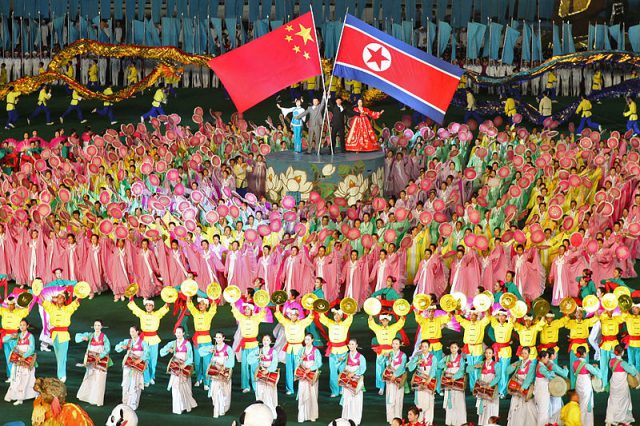
When Kim Jong-un
visited Beijing in late March, the world took notice. That was Kim’s first visit to China—and his first meeting with Chinese President Xi Jinping—since he became North Korea’s ruler in December 2011.
International media noted some fascinating details about the Xi–Kim meeting. When Xi spoke, Kim took notes and gave the Chinese leader his full attention. When Kim spoke, Xi listened with a benevolent gaze. Kim appeared as a supplicant and Xi as an elder statesman. Kim also said, according to China’s
Xinhua News Agency, that it was his ‘obligation’ based on ‘emotional bonds and moral responsibility’ to report major developments on the Korean peninsula to Xi in person.
Kim’s apparent deference to Xi recalled the old ‘tributary relationship’ between Korea and China before the 19th century.
A tributary relationship was one where China’s neighbours established official relations with China by going to the Chinese court and offering tribute to the Chinese emperor in the form of native products.
At least one exchange between Kim and Xi seemed a prima facie example of a tributary relationship. Based on video footage, it was
estimated that Kim presented gifts worth 170,000 Chinese yuan (US$27,000) to Xi, who returned gifts approaching the value of 2.5 million yuan (US$396,000) to Kim.
The Chinese gifts were 14 times more valuable than the North Korean offerings. This seems to coincide exactly with the traditional tributary principle of
hou wang bo lai—those who come modestly are sent off generously.
But it would be a big mistake to see the visit as indicative of a tributary relationship reincarnate. Even the superficial appearances of Kim’s deference and the lopsided nature of the gift exchange have logical—and non-tributary—explanations.
It was not odd for the 34-year-old Kim to show deference to the 64-year-old Xi—etiquette befitting a junior–senior relationship in Asian cultures. And no one expected North Korea—poverty-stricken and severely sanctioned as it is—to bring lavish gifts to Beijing. A bit of deference and flattery from Kim was a necessary price for managing an asymmetrical relationship.
The visit suggests a return to the previously stable relationship the two countries had before the 2012–2017 period of estrangement and friction. But it’s not a return to a mythical golden era of a close alliance.
That myth was in part created by Mao Zedong, who once described the relationship as ‘close as lips and teeth’. But that characterisation was true only in a geographical sense, and Chinese elites know this. A 9 March
Global Times editorial contends that China has ceased to have much influence over North Korea since the end of the Korean War in 1953. Beijing and Pyongyang had quarrelled over the conduct of that war and mutual mistrust had grown even before the two signed an alliance treaty in 1961.
The relationship is one of mutual need, then and now. North Korea would bristle at being seen as China’s tributary vassal. Nationalism—a powerful force in the modern world—is the greatest enemy of old-style tributary relations, and Korean nationalism on both ends of the peninsula is fierce. North Korean elites are mistrustful of China, as many South Koreans are of America.
Nevertheless, Pyongyang has to tolerate the power asymmetry in its relationship with Beijing, and must acknowledge China’s centrality in Northeast Asia. Kim thus figured—correctly—that keeping China in the loop about his new diplomacy with South Korea and America would smooth Chinese anxiety and facilitate Chinese assistance when necessary. It was also a smart move to ease North Korea’s isolation and increase its negotiation leverage with the US.
Acknowledging Chinese centrality doesn’t indicate undue passivity or deference. North Korea has shown great initiative and audacity—and has challenged Chinese preferences—in its nuclear and missile programs. Kim’s visit to Beijing,
of his own initiative and conveniently obliged by Beijing, was his diplomatic pre-emption to create manoeuvring space ahead of his summit meetings with South Korean president Moon Jae-in and American president Donald Trump. He was hardly a modern-day supplicant.
On the Chinese side, a complicated mingling of historical consciousness, geopolitical necessity, ideological bonds and situational exigencies means that China also needs North Korea. China wants denuclearisation, but would baulk if the price to be paid is major instability that brings down the North Korean regime and destabilises China’s north-eastern frontier.
From time to time, Beijing applies diplomatic and economic pressure in the hope of persuading or compelling Pyongyang to abandon its weapons programs. Yet, mindful of history and geography, and the havoc a hostile or unstable North Korea can wreak, China wants to keep it a friend, however estranged.
Politically, and perhaps sentimentally as well, it’s difficult for the Chinese Communist Party (CCP) to abandon a fellow Communist regime with whom it had spilled blood on the battlefield. During his meeting with Kim, Xi recalled the two countries’ ‘deep revolutionary friendship’, and remarked that inheriting and developing this friendship is the ‘only correct choice’.
That ‘revolutionary’ frame of reference shouldn’t be dismissed out of hand. It appeals to CCP conservatives and speaks to the legitimacy of the party’s rule in China.
Kim’s visit solved China’s immediate anxiety of appearing to be excluded from the high-level diplomacy between the two Koreas and the United States. Feeling more certain of its indispensability in any future settlement of the Korean issue, Beijing can now be open-minded toward Kim’s meetings with Moon and Trump.
So, the Sino–North Korean relationship remains more of the same—better than the nadir of 2012–2017 but no better than the average since 1953.
 Print This Post
Print This Post